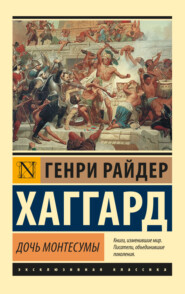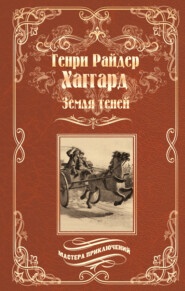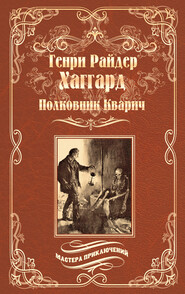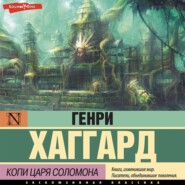По всем вопросам обращайтесь на: info@litportal.ru
(©) 2003-2024.
✖
The World's Desire
Настройки чтения
Размер шрифта
Высота строк
Поля
“Wouldst thou indeed enter to thy doom, thou mighty lord?” asked the priest, for he knew him well again.
“Ay, I enter; but perchance not to my doom,” answered the Wanderer. Then he passed in and the brazen gate was shut behind him.
Now the two priests came forward to bind his eyes, but this he would not endure.
“Not so,” he said; “I am come here to see what may be seen.”
“Go to, thou madman, go to! and die the death,” they answered, and led all the men to the centre of the courtyard whence they might see the pylon top. Then the priests also covered up their eyes and cast themselves at length upon the ground; so for a while they lay, and all was silence within and without the court, for they waited the coming of the Hathor. The Wanderer glanced through the bars of bronze at the multitude gathered there. Silent they stood with upturned eyes, even the women had ceased from weeping and stood in silence. He looked at those beside him. Their bandaged faces were lifted and they stared towards the pylon top as though their vision pierced the cloths. The blind man, too, stared upward, and his pale lips moved, but no sound came from them. Now at the foot of the pylon lay a little rim of shadow. Thinner and thinner it grew as the moments crept on towards the perfect noon. Now there was but a line, and now the line was gone, for the sun’s red disc burned high in the blue heaven straight above the pylon brow. Then suddenly and from afar there came a faint sweet sound of singing, and at the first note of the sound a great sigh went up through the quiet air, from all the multitude without. Those who were near the Wanderer sighed also, and their lips and fingers twitched, and he himself sighed, though he knew not why.
Nearer came the sweet sound of singing, and stronger it swelled, till presently those without the temple gate who were on higher ground caught sight of her who sang. Then a hoarse roar went up from every throat, and madness took them. On they rushed, dashing themselves against the gates of bronze and the steep walls on either side, and beat upon them madly with their fists and brows, and climbed on each other’s shoulders, gnawing at the bars with their teeth, crying to be let in. But the women threw their arms about them and screamed curses on her whose beauty brought all men to madness.
So it went for a while, till presently the Wanderer looked up, and lo! upon the pylon’s brow stood the woman’s self, and at her coming all were once more silent. She was tall and straight, clad in clinging white, but on her breast there glowed a blood-red ruby stone, fashioned like a star, and from it fell red drops that stained for one moment the whiteness of her robes, and then the robe was white again. Her golden hair was tossed this way and that, and shone in the sunlight, her arms and neck were bare, and she held one hand before her eyes as though to hide the brightness of her beauty. For, indeed, she could not be called beautiful but Beauty itself.
And they who had not loved saw in her that first love whom no man has ever won, and they who had loved saw that first love whom every man has lost. And all about her rolled a glory – like the glory of the dying day. Sweetly she sang a song of promise, and her voice was the voice of each man’s desire, and the heart of the Wanderer thrilled in answer to it as thrills a harp smitten by a cunning hand; and thus she sang:
Whom hast thou longed for most,
True love of mine?
Whom hast thou loved and lost?
Lo, she is thine!
She that another wed
Breaks from her vow;
She that hath long been dead
Wakes for thee now.
Dreams haunt the hapless bed,
Ghosts haunt the night,
Life crowns her living head,
Love and Delight.
Nay, not a dream nor ghost,
Nay, but Divine,
She that was loved and lost
Waits to be thine!
She ceased, and a moan of desire went up from all who heard.
Then the Wanderer saw that those beside him tore at the bandages about their brows and rent them loose. Only the priests who lay upon the ground stirred not, though they also moaned.
And now again she sang, still holding her hand before her face:
Ye that seek me, ye that sue me,
Ye that flock beneath my tower,
Ye would win me, would undo me,
I must perish in an hour,
Dead before the Love that slew me, clasped the
Bride and crushed the flower.
Hear the word and mark the warning,
Beauty lives but in your sight,
Beauty fades from all men’s scorning
In the watches of the night,
Beauty wanes before the morning, and
Love dies in his delight.
She ceased, and once more there was silence. Then suddenly she bent forward across the pylon brow so far that it seemed that she must fall, and stretching out her arms as though to clasp those beneath, showed all the glory of her loveliness.
The Wanderer looked, then dropped his eyes as one who has seen the brightness of the noonday sun. In the darkness of his mind the world was lost, and he could think of naught save the clamour of the people, which fretted his ears. They were all crying, and none were listening.
“See! see!” shouted one. “Look at her hair; it is dark as the raven’s wing, and her eyes – they are dark as night. Oh, my love! my love!”
“See! see!” cried another, “were ever skies so blue as those eyes of hers, was ever foam so white as those white arms?”
“Even so she looked whom once I wed many summers gone,” murmured a third, “even so when first I drew her veil. Hers was that gentle smile breaking like ripples on the water, hers that curling hair, hers that child-like grace.”
“Was ever woman so queenly made?” said a fourth. “Look now on the brow of pride, look on the deep, dark eyes of storm, the arched lips, and the imperial air. Ah, here indeed is a Goddess meet for worship.”
“Not so I see her,” cried a fifth, that man who had come from the host of the Apura. “Pale she is and fair, tall indeed, but delicately shaped, brown is her hair, and brown are her great eyes like the eyes of a stag, and ah, sadly she looks upon me, looking for my love.”
“My eyes are opened,” screamed the blind man at the Wanderer’s side. “My eyes are opened, and I see the pylon tower and the splendid sun. Love hath touched me on the eyes and they are opened. But lo! not one shape hath she but many shapes. Oh, she is Beauty’s self, and no tongue may tell her glory. Let me die! let me die, for my eyes are opened. I have looked on Beauty’s self! I know what all the world journeys on to seek, and why we die and what we go to find in death.”
VI THE WARDENS OF THE GATE
The clamour swelled or sank, and the men called or cried the names of many women, some dead, some lost. Others were mute, silent in the presence of the World’s Desire, silent as when we see lost faces in a dream. The Wanderer had looked once and then cast down his eyes and stood with his face hidden in his hands. He alone waited and strove to think; the rest were abandoned to the bewilderment of their passions and their amaze.
What was it that he had seen? That which he had sought his whole life long; sought by sea and land, not knowing what he sought. For this he had wandered with a hungry heart, and now was the hunger of his heart to be appeased? Between him and her was the unknown barrier and the invisible Death. Was he to pass the unmarked boundary, to force those guarded gates and achieve where all had failed? Had a magic deceived his eyes? Did he look but on a picture and a vision that some art could call again from the haunted place of Memory?
He sighed and looked again. Lo! in his charmed sight a fair girl seemed to stand upon the pylon brow, and on her head she bore a shining urn of bronze.
He knew her now. He had seen her thus at the court of King Tyndareus as he drove in his chariot through the ford of Eurotas; thus he had seen her also in the dream on the Silent Isle.
Again he sighed and again he looked. Now in his charmed sight a woman sat, whose face was the face of the girl, grown more lovely far, but sad with grief and touched with shame.
He saw her and he knew her. So he had seen her in Troy towers when he stole thither in a beggar’s guise from the camp of the Achæans. So he had seen her when she saved his life in Ilios.
Again he sighed and again he looked, and now he saw the Golden Helen.
She stood upon the pylon’s brow. She stood with arms outstretched, with eyes upturned, and on her shining face there was a smile like the infinite smile of the dawn. Oh, now indeed he knew the shape that was Beauty’s self – the innocent Spirit of Love sent on earth by the undying Gods to be the doom and the delight of men; to draw them through the ways of strife to the unknown end.
Awhile the Golden Helen stood thus looking up and out to the worlds beyond; to the peace beyond the strife, to the goal beyond the grave. Thus she stood while men scarce dared to breathe, summoning all to come and take that which upon the earth is guarded so invincibly.
Then once more she sang, and as she sang, slowly drew herself away, till at length nothing was left of the vision of her save the sweetness of her dying song.
Who wins his Love shall lose her,
Who loses her shall gain,
For still the spirit woos her,
A soul without a stain;
And Memory still pursues her
With longings not in vain!
“Ay, I enter; but perchance not to my doom,” answered the Wanderer. Then he passed in and the brazen gate was shut behind him.
Now the two priests came forward to bind his eyes, but this he would not endure.
“Not so,” he said; “I am come here to see what may be seen.”
“Go to, thou madman, go to! and die the death,” they answered, and led all the men to the centre of the courtyard whence they might see the pylon top. Then the priests also covered up their eyes and cast themselves at length upon the ground; so for a while they lay, and all was silence within and without the court, for they waited the coming of the Hathor. The Wanderer glanced through the bars of bronze at the multitude gathered there. Silent they stood with upturned eyes, even the women had ceased from weeping and stood in silence. He looked at those beside him. Their bandaged faces were lifted and they stared towards the pylon top as though their vision pierced the cloths. The blind man, too, stared upward, and his pale lips moved, but no sound came from them. Now at the foot of the pylon lay a little rim of shadow. Thinner and thinner it grew as the moments crept on towards the perfect noon. Now there was but a line, and now the line was gone, for the sun’s red disc burned high in the blue heaven straight above the pylon brow. Then suddenly and from afar there came a faint sweet sound of singing, and at the first note of the sound a great sigh went up through the quiet air, from all the multitude without. Those who were near the Wanderer sighed also, and their lips and fingers twitched, and he himself sighed, though he knew not why.
Nearer came the sweet sound of singing, and stronger it swelled, till presently those without the temple gate who were on higher ground caught sight of her who sang. Then a hoarse roar went up from every throat, and madness took them. On they rushed, dashing themselves against the gates of bronze and the steep walls on either side, and beat upon them madly with their fists and brows, and climbed on each other’s shoulders, gnawing at the bars with their teeth, crying to be let in. But the women threw their arms about them and screamed curses on her whose beauty brought all men to madness.
So it went for a while, till presently the Wanderer looked up, and lo! upon the pylon’s brow stood the woman’s self, and at her coming all were once more silent. She was tall and straight, clad in clinging white, but on her breast there glowed a blood-red ruby stone, fashioned like a star, and from it fell red drops that stained for one moment the whiteness of her robes, and then the robe was white again. Her golden hair was tossed this way and that, and shone in the sunlight, her arms and neck were bare, and she held one hand before her eyes as though to hide the brightness of her beauty. For, indeed, she could not be called beautiful but Beauty itself.
And they who had not loved saw in her that first love whom no man has ever won, and they who had loved saw that first love whom every man has lost. And all about her rolled a glory – like the glory of the dying day. Sweetly she sang a song of promise, and her voice was the voice of each man’s desire, and the heart of the Wanderer thrilled in answer to it as thrills a harp smitten by a cunning hand; and thus she sang:
Whom hast thou longed for most,
True love of mine?
Whom hast thou loved and lost?
Lo, she is thine!
She that another wed
Breaks from her vow;
She that hath long been dead
Wakes for thee now.
Dreams haunt the hapless bed,
Ghosts haunt the night,
Life crowns her living head,
Love and Delight.
Nay, not a dream nor ghost,
Nay, but Divine,
She that was loved and lost
Waits to be thine!
She ceased, and a moan of desire went up from all who heard.
Then the Wanderer saw that those beside him tore at the bandages about their brows and rent them loose. Only the priests who lay upon the ground stirred not, though they also moaned.
And now again she sang, still holding her hand before her face:
Ye that seek me, ye that sue me,
Ye that flock beneath my tower,
Ye would win me, would undo me,
I must perish in an hour,
Dead before the Love that slew me, clasped the
Bride and crushed the flower.
Hear the word and mark the warning,
Beauty lives but in your sight,
Beauty fades from all men’s scorning
In the watches of the night,
Beauty wanes before the morning, and
Love dies in his delight.
She ceased, and once more there was silence. Then suddenly she bent forward across the pylon brow so far that it seemed that she must fall, and stretching out her arms as though to clasp those beneath, showed all the glory of her loveliness.
The Wanderer looked, then dropped his eyes as one who has seen the brightness of the noonday sun. In the darkness of his mind the world was lost, and he could think of naught save the clamour of the people, which fretted his ears. They were all crying, and none were listening.
“See! see!” shouted one. “Look at her hair; it is dark as the raven’s wing, and her eyes – they are dark as night. Oh, my love! my love!”
“See! see!” cried another, “were ever skies so blue as those eyes of hers, was ever foam so white as those white arms?”
“Even so she looked whom once I wed many summers gone,” murmured a third, “even so when first I drew her veil. Hers was that gentle smile breaking like ripples on the water, hers that curling hair, hers that child-like grace.”
“Was ever woman so queenly made?” said a fourth. “Look now on the brow of pride, look on the deep, dark eyes of storm, the arched lips, and the imperial air. Ah, here indeed is a Goddess meet for worship.”
“Not so I see her,” cried a fifth, that man who had come from the host of the Apura. “Pale she is and fair, tall indeed, but delicately shaped, brown is her hair, and brown are her great eyes like the eyes of a stag, and ah, sadly she looks upon me, looking for my love.”
“My eyes are opened,” screamed the blind man at the Wanderer’s side. “My eyes are opened, and I see the pylon tower and the splendid sun. Love hath touched me on the eyes and they are opened. But lo! not one shape hath she but many shapes. Oh, she is Beauty’s self, and no tongue may tell her glory. Let me die! let me die, for my eyes are opened. I have looked on Beauty’s self! I know what all the world journeys on to seek, and why we die and what we go to find in death.”
VI THE WARDENS OF THE GATE
The clamour swelled or sank, and the men called or cried the names of many women, some dead, some lost. Others were mute, silent in the presence of the World’s Desire, silent as when we see lost faces in a dream. The Wanderer had looked once and then cast down his eyes and stood with his face hidden in his hands. He alone waited and strove to think; the rest were abandoned to the bewilderment of their passions and their amaze.
What was it that he had seen? That which he had sought his whole life long; sought by sea and land, not knowing what he sought. For this he had wandered with a hungry heart, and now was the hunger of his heart to be appeased? Between him and her was the unknown barrier and the invisible Death. Was he to pass the unmarked boundary, to force those guarded gates and achieve where all had failed? Had a magic deceived his eyes? Did he look but on a picture and a vision that some art could call again from the haunted place of Memory?
He sighed and looked again. Lo! in his charmed sight a fair girl seemed to stand upon the pylon brow, and on her head she bore a shining urn of bronze.
He knew her now. He had seen her thus at the court of King Tyndareus as he drove in his chariot through the ford of Eurotas; thus he had seen her also in the dream on the Silent Isle.
Again he sighed and again he looked. Now in his charmed sight a woman sat, whose face was the face of the girl, grown more lovely far, but sad with grief and touched with shame.
He saw her and he knew her. So he had seen her in Troy towers when he stole thither in a beggar’s guise from the camp of the Achæans. So he had seen her when she saved his life in Ilios.
Again he sighed and again he looked, and now he saw the Golden Helen.
She stood upon the pylon’s brow. She stood with arms outstretched, with eyes upturned, and on her shining face there was a smile like the infinite smile of the dawn. Oh, now indeed he knew the shape that was Beauty’s self – the innocent Spirit of Love sent on earth by the undying Gods to be the doom and the delight of men; to draw them through the ways of strife to the unknown end.
Awhile the Golden Helen stood thus looking up and out to the worlds beyond; to the peace beyond the strife, to the goal beyond the grave. Thus she stood while men scarce dared to breathe, summoning all to come and take that which upon the earth is guarded so invincibly.
Then once more she sang, and as she sang, slowly drew herself away, till at length nothing was left of the vision of her save the sweetness of her dying song.
Who wins his Love shall lose her,
Who loses her shall gain,
For still the spirit woos her,
A soul without a stain;
And Memory still pursues her
With longings not in vain!

















